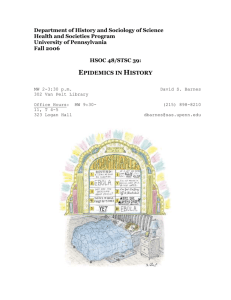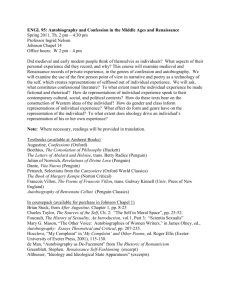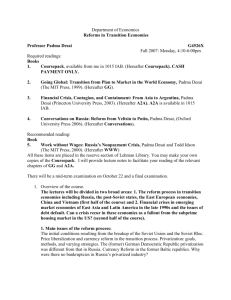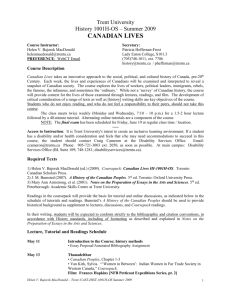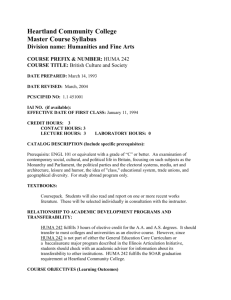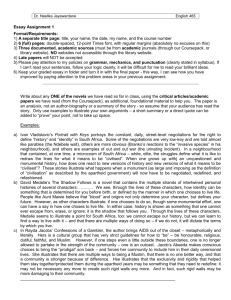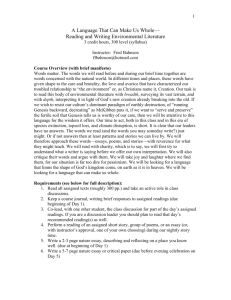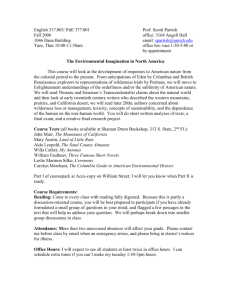2012_Fall_HIST 232_01_13519
advertisement
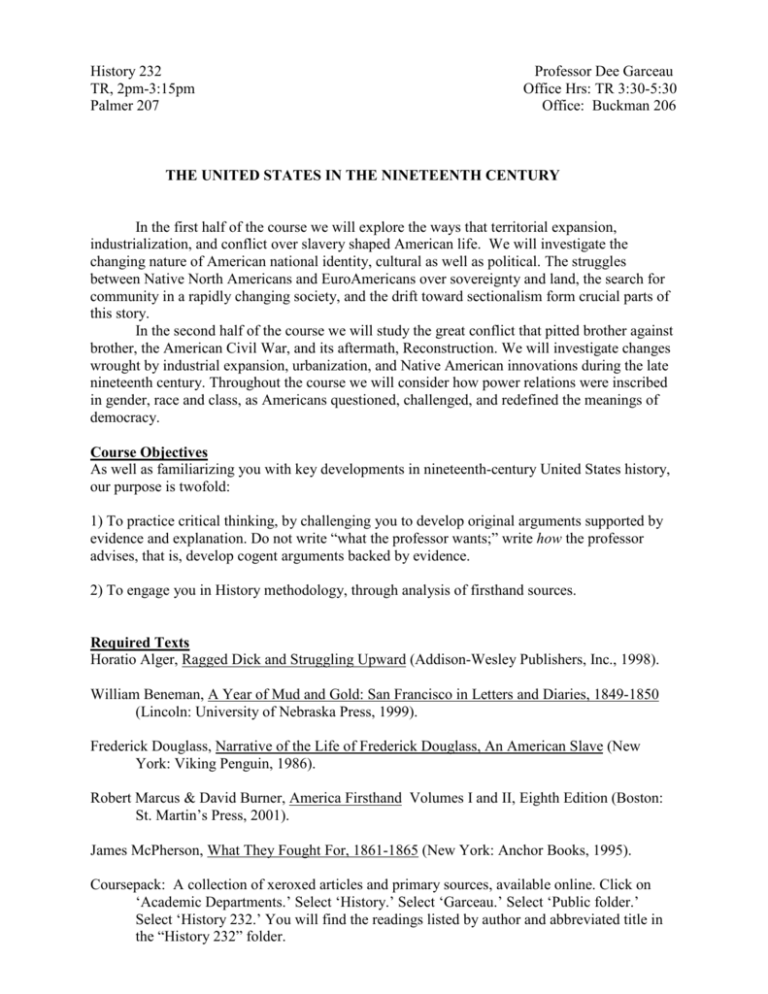
History 232 TR, 2pm-3:15pm Palmer 207 Professor Dee Garceau Office Hrs: TR 3:30-5:30 Office: Buckman 206 THE UNITED STATES IN THE NINETEENTH CENTURY In the first half of the course we will explore the ways that territorial expansion, industrialization, and conflict over slavery shaped American life. We will investigate the changing nature of American national identity, cultural as well as political. The struggles between Native North Americans and EuroAmericans over sovereignty and land, the search for community in a rapidly changing society, and the drift toward sectionalism form crucial parts of this story. In the second half of the course we will study the great conflict that pitted brother against brother, the American Civil War, and its aftermath, Reconstruction. We will investigate changes wrought by industrial expansion, urbanization, and Native American innovations during the late nineteenth century. Throughout the course we will consider how power relations were inscribed in gender, race and class, as Americans questioned, challenged, and redefined the meanings of democracy. Course Objectives As well as familiarizing you with key developments in nineteenth-century United States history, our purpose is twofold: 1) To practice critical thinking, by challenging you to develop original arguments supported by evidence and explanation. Do not write “what the professor wants;” write how the professor advises, that is, develop cogent arguments backed by evidence. 2) To engage you in History methodology, through analysis of firsthand sources. Required Texts Horatio Alger, Ragged Dick and Struggling Upward (Addison-Wesley Publishers, Inc., 1998). William Beneman, A Year of Mud and Gold: San Francisco in Letters and Diaries, 1849-1850 (Lincoln: University of Nebraska Press, 1999). Frederick Douglass, Narrative of the Life of Frederick Douglass, An American Slave (New York: Viking Penguin, 1986). Robert Marcus & David Burner, America Firsthand Volumes I and II, Eighth Edition (Boston: St. Martin’s Press, 2001). James McPherson, What They Fought For, 1861-1865 (New York: Anchor Books, 1995). Coursepack: A collection of xeroxed articles and primary sources, available online. Click on ‘Academic Departments.’ Select ‘History.’ Select ‘Garceau.’ Select ‘Public folder.’ Select ‘History 232.’ You will find the readings listed by author and abbreviated title in the “History 232” folder. Effective Planning Your performance in this class will be strengthened by good planning and preparation: • On days marked Discussion, come to class prepared; that is, having done the readings listed for that day. Participation in discussion will make up 25% of your grade. I will call on you every class to discuss the topics at hand. • Note that on September 25, October 9, October 18, and November 15 you will be responsible for having read a whole book. Note that September 20 and November 6 also have lengthy reading assignments. Plan accordingly, so that you show up fully prepared. • We have a midterm exam scheduled for September 27, and a second midterm exam scheduled for October 25. Plan accordingly so that you are not writing major papers on the same night that you study for each of these exams. The Registrar will schedule the day and time of our final exam. • When reading, listening to lectures, or viewing films, take notes. You will create a valuable record of ideas, evidence, and questions which you can use during discussion, as well as when studying for exams. Course Requirements 1) Consistent attendance and participation. At Rhodes, we have the advantage of small classes in which everyone can participate in discussion. This also means I cannot recreate a discussion with your participation, if you were absent. In other words, missed classes cannot be “made up.” Over three absences will lower your average by one letter grade. 2) Completion of assigned work, on time. Exams or presentations missed without a verifiable medical reason will earn a grade of zero. 3) All work for this course should be pledged under the Honor Code. Use of exams, outlines, or study notes prepared by another student is plagiarism. Plagiarism is a violation of the Honor Code, and will result in an automatic ‘F.’ Assignments 1) Informed participation in scheduled discussions. That means you refer specifically and cogently to material within the texts we have read. Feel free to raise questions about the readings too; often this moves discussion forward. (25%) 2) An in-class essay exam on the period from the 1790s through the 1840s. (25%) 3) An in-class essay exam on the Civil War era. (25%) 4) A final essay exam on larger themes in the course, including the era of Reconstruction and the Gilded Age. (25%). COURSE OUTLINE Th Aug 24 Introduction to the Course THE NEW NATION T Aug 28 An International Continent Discussion: Colin Calloway, “The Aftermath of the Revolution in Indian Country,” Coursepack, 171-81. Helen Tanner, “The Glaize in 1792,” Coursepack, 380-403. Th Aug 30 Early Industrialization and Democracy Discussion: Bruce Laurie, “Nothing on Compulsion: The Lifestyles of Philadelphia Artisans, 1820-1850” Coursepack, 172-80. John Kasson, “Civilizing the Machine” Coursepack, 198-218. Mary Paul, “The Lowell Textile Workers,” America Firsthand (I) 215-21. T Sept 4 The Ideology of Separate Spheres Discussion: Laurel Ulrich, “Warpt a Piece,” Coursepack, 54-65. Jeanne Boydston, “The Pastoralization of Housework,” Coursepack, 138-49. Donald Yacavone, “Victorian Manhood and the Language of Fraternal Love,” Coursepack, 197-211. Th Sept 6 Perfectionism, Reforms, and Utopias Discussion: James McGready, “The Great Revival of 1800,” America Firsthand (I) 147-51. Morris Bishop,”The Great Oneida Love-In,” Coursepack, 224-34 Timothy Shay Arthur, “Ten Nights in a Barroom,” Coursepack, 249-56. Frances Trollope, “Religion in America,” America Firsthand, 157-61. T Sept 11 Interpreting Democracy: American Genre Painting [Slide Lecture] Handout: Selected Nineteenth-Century American Paintings Th Sept 13 The Extent and Limits of Liberty Discussion: Perley Poore & James Parton, “A Disorderly Democracy,” Coursepack, 170-76. Elliot Gorn, “Gouge and Bite, Pull Hair and Scratch: The Social Significance of Fighting in the Southern Backcountry” Coursepack, 220-36. Elizabeth Cady Stanton, “A Pioneer for Women’s Rights,” America Firsthand (I) 236-43. Massachusetts Congregationalist Clergy, “Letter Opposing Women’s Rights, 1837” Coursepack, 147-8. T Sept 18 Sovereignty vs. Wardship: The Cherokee Removal [lecture] Reading: John Ross, “The Trail of Tears,” America Firsthand (I) 171-76. Th Sept 20 Cherokee People: Separating History from Stereotype Discussion: “A Cherokee View of Civilization,“ Coursepack, 31-33. John Ridge, “Letter to Albert Gallatin,” Coursepack, 34-43. Theda Purdue, “Christian Missions,” Coursepack, 43-45. Elizabeth Taylor, Sally Reece, & Nancy Reece, “Letters,” Coursepack, 45-48. Theda Purdue, “Quantifying Cherokee Civilization,” Coursepack, 48-57. T Sept 25 The California Gold Rush Discussion: William Beneman, A Year of Mud and Gold: San Francisco in Letters and Diaries, 1849-1850. Th Sept 27 First Essay Exam THE CIVIL WAR T Oct 2 Sectionalism, State’s Rights, and the Expansion of Slavery [lecture] Reading: “Points of View: Nat Turner’s Rebellion,” America Firsthand (I) pp.200-14. Th Oct 4 Professor Garceau at Western History Association Conference in Denver. T Oct 9 Southern Hierarchies and African-American Resistance Discussion: Frederick Douglass, Narrative of the Life of Frederick Douglass, An American Slave. (Read the whole book). Melton McLaurin, “Celia: Slavery and Sexual Exploitation,” Coursepack, pp.209-24. Th Oct 11 A House Divided Discussion: James Henry Hammond, “The Proslavery Argument,” Coursepack, 196-200. John Pendleton Kennedy, “The Southern Plantation Idyll,” Coursepack, 229-32. South Carolina Ordinance and Declaration of the Causes of Secession, Coursepack, 249-52. Texas Ordinance and Declaration of the Causes of Secession, Coursepack, 1-4. T Oct 16 Fall Break Th Oct 18 Soldier Points of View, Confederate and Union Discussion: James McPherson, What They Fought For, pp.1-69. Abe Lincoln, “Gettysburg Address” Coursepack, 1 pg. Letters From Black Union Soldiers, America Firsthand (I) 295-301. T Oct 23 The Civil War: A Modern War and Its Meanings Discussion: Film: “The Civil War” [On Reserve at Barret Library]. Matthew Pinsker, “The Underground Railroad,” Coursepack, 1-3. Eric Foner, “Lincoln’s Interpretation of the Civil War,” Coursepack, 1-3. Bruce Levine, “Riddles of Confederate ‘Emancipation,” Coursepack, 1-3. Catherine Clinton, “Women and the Home Front,” Coursepack, 1-3. Th Oct 25 Second Midterm Exam THE ERA OF RECONSTRUCTION T Oct 30 Presidential and Congressional Reconstruction [lecture] Reading: “African-Americans During Reconstruction,” America Firsthand (I) pp.309-13. Henry Ravenel, “A Slaveowner’s Journal at the End of the Civil War,” America Firsthand (I) pp.3269-75. Th Nov 1 Radical Reconstruction Discussion: Eric Foner, “Black Reconstruction Leaders at the Grassroots,” Coursepack, 4-14. Elizabeth R. Bethel, “Promised Land” Coursepack, 3-15. Caleb Forshey et al, “White Southerners’ Reactions to Reconstruction,” America Firsthand (I) pp.314-20. T Nov 6 Race Relations after Reconstruction: Problems and Strategies Discussion: Rosy Williams et al., “The Murder of Jim Williams,” America Firsthand (II) pp. 26-34. “Work Under Sharecropper and Labor Contracts,” America Firsthand (II) pp.35-38. Booker T. Washington, "Atlanta Address," Coursepack, 1-4. W.E.B. DuBois, "The Niagara Movement,” pp.311-12, and "The Talented Tenth," Coursepack, 21-24. Henry McNeal Turner, "The American Negro and His Fatherland," Coursepack, 25-30. THE GILDED AGE Th Nov 8 Industrial Expansion and Corporate Consolidation [lecture] Discussion: Joseph Finnerty, “The Decline of the Independent Craftsman, America Firsthand (II) pp.58-64. George Rice, “Losing Out to Standard Oil,” America Firsthand (II) 75-81. “Chicago Workers Satirize Their Bosses,” Coursepack, 66-67. p T Nov 13 Immigration, the Factory Workday, and Organized Labor Discussion: “Points of View: The Triangle Shirtwaist Fire,” America Firsthand (II) 104-14. Upton Sinclair, “Conditions at the Slaughterhouse,” Coursepack, 142-49. William Steinway, “Workers Prosper as Industry Grows,” America Firsthand (II) pp.65-73. Letter from a Tennessee Mine Disaster Coursepack, 1 page. Th Nov 15 Industrial Growth and American Identity Discussion: Horatio Alger, “Struggling Upward; or, Luke Larkin’s Luck,” in Ragged Dick, 135-280. T Nov 20 The New Woman in Urban and Rural Life [lecture] Discussion: Kathy Peiss, “Working Women and Consumer Culture in Turn-of-the-Century New York,” Coursepack, 20-22. Oral Histories of Mary Culbertson & Helen Coburn Howell, Coursepack, 235-43. Nov 21-25 Thanksgiving Break T Nov 27 Film: “Around the World in 72 Days: The Story of Nellie Bly” Th Nov 29 The Dawes Era in Indian Policy Discussion: Peter Iverson, “When Indians Became Cowboys,” Coursepack, 16-31. T Dec 4 American Imperialism at the Turn of the Century [lecture] Discussion: David Kohler & James Wensyel, “America’s First Southeast Asian War: The Phillipine Insurrection,” Coursepack, 106-19. Final Exam * * Day/Time TBA * * * * * * * * * * * *
